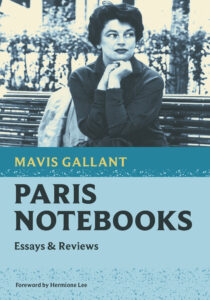
Hermione Lee on Mavis Gallant, "Unerring Stylist"
"A writer for whom nothing is alien and everything is possible"
“All lives are interesting; no one life is more interesting than another.” “I simply followed events as they occurred from day to day, keeping track of conversations and things observed.” “One of the hardest things in the world is to describe what happened next.” There is the voice of Mavis Gallant: unblinkingly attentive and keen-eyed, making little of herself and much of others, tracking every nuance of human behavior, wise, dry, funny, and subtle.
One of the fascinating monsters she writes about in these essays (and she never flinches from monsters), the journalist and diarist Paul Léautaud, was asked why he went to observe his dreadful father’s deathbed. He replied, spelling it out: “Cu-ri-o-si-té.” Gallant’s own Cu-ri-o- si-té, as a novelist, short-story writer, diarist, critic, and reporter, is omnivorous. And it is never more acute than when writing about her adopted country and its people. From her mid-twenties a naturalized Parisian and Francophile, she was also a Canadian-born outsider. As one of her admirers and fellow-Francophiles Anita Brookner put it in a 1988 article in the Observer: “For those who cannot live in Paris she is an essential witness.” Much of Gallant’s writing life was taken up with sending “translations” of French affairs to readers of the New York Times Book Review, the New York Review of Books, and The New Yorker, which was also—thanks to the legendary editor William Maxwell—the home for her marvellous short stories. Like Edith Wharton or Janet Flanner, both of whom Gallant admired, she was an impeccable transcriber of French life for North American readers. She did this with the true fiction writer’s combination of deep feeling and estrangement, and out of a lifelong compulsion to turn lived experience into memorable sentences. In the preface to her Selected Stories, she cites with wry fellow feeling the response of another exile-in-France, Samuel Beckett, on being asked “a hopeless question from a Paris newspaper—‘Why do you write?’” He said, “It was all he was good for: ‘Bon qu’a ça.’”
The longest piece in Paris Notebooks (which dates from the 1960s to the 1980s and was first published in 1986) is the diary she kept during the “événements” of May ’68, the huge students and workers revolution that started in Paris, spread all over the country, changed everyone’s lives, and was over within seven weeks. This account is written without what she calls “the irony of hindsight” or the “confused collective memory” that subsequently settled into French consciousness, making a “soixante-huitard” into “a nostalgic bourgeois” and, frequently, “a colossal bore, to whom, one feels, nothing else has ever happened.” Gallant is reporting from the thick of things, clinging on to a traffic island as a sea of flag-waving students and workers bear down on her, her eyes smarting from tear gas leaking down into the Métro, sitting through the hectic and repetitive political debates in the occupied Sorbonne, glued day and night to the news reports, filled like everyone else with exhilaration, admiration (“How brave these kids are now!”), fear, bewilderment, and exhaustion. She tells us exactly how it felt to be there. It is bitterly cold. The “speaking clock” is on strike; in the “well-to-do suburbs” “they are stealing gas from each other’s cars”; the trees of Paris are being cut down; there is panic-buying and hoarding, and the streets are full of leaflets, smashed signs, broken grilles, wrecked traffic lights, and rubbish:
Garbage piled on curb of Rue de Sèvres. Cluster of pedestrians staring at something. Five plastic bags, each holding a kilo of peeled new potatoes rotting in the sun. Hoarder evidently didn’t know that peeled potatoes in plastic bags rot quickly, have to be used almost the day you buy them. Five kilos!
Through this exact, close-range lens, all the big stories emerge, including the atrocious police violence, the shifting politics of left and right, the clash between generations, the suspense as to the outcome, and the sudden end. What was it all for, what did people want, she keeps asking and being asked. Even long afterward, she still finds something noble and “poignant” in the answer: “Quelque chose de propre.” Something decent.
That mixture of emotion and detachment colors all the writing, notably in her report on a scandal that electrified France at the end of 1968 and which, as she shows us, is unintelligible without the context of the “événements,” of the French judicial system, French prison conditions, French psychiatric practice, and French attitudes to women. The shocking and tragic story of Gabrielle Russier, an emotionally immature thirty-year-old divorced schoolteacher and mother of two, who had an affair with her nineteen-year-old student, was punitively treated by the boy’s Communist parents and by the law, was sent to prison and committed suicide, is analysed with forensic care. Gallant presents the case in all its moral and social complexity, without passing judgment on the protagonists, but with strong words for a society where, intellectually, socially, and professionally, women are respected and accepted, but where in law, “women never have the last word.”
You can feel Gallant itching to turn the Russier case into a novel or a short story, with the mysteries and perversities of human relationships at its heart. Every so often she opens it out: “The question of what people see in each other still defies analysis.” “Even the most selfless and indulgent parents will seldom grant [their children] the right to a private life without a struggle.” “One of the lessons of literature . . . is the hopeless folly of trying to separate lovers by force.”
That experienced, ironical tone marks her fiction, which anyone coming to Gallant for the first time with the collection should certainly go on to read. It’s the voice of a writer for whom nothing is alien and everything is possible. Her stories, like her essays, pay calm attention to extreme and often cruel events, peculiar types, irrational acts, loss and grief, “love, hate and desire.” Her fictional characters are émigrés, war-survivors, refugees, divorcées, orphans, the homeless and the emotionally displaced, people “in transit” (the title of one of her collections) or who have “jumped out of a social enclosure.” She herself is a kind of displaced person of the imagination, with an uncanny ability to make herself at home in other minds, and to ingest the lives of others as forms of “information.”
That is what makes her accounts of the challenging, notable personalities she writes about here so compelling. Her brief, masterly pieces on Giraudoux, Yourcenar, Nabokov, de Beauvoir, Malraux, Céline, Colette, Simenon, and the wonderfully repulsive journalist and diarist Paul Léautaud are brilliantly poised between satire and inwardness, objectivity and fascination. She knows her French cultural icons like the back of her hand—“I am devoted to Giraudoux’s writing in the way that some people are Gaullists or vegetarians”—and she is irresistibly sharp on their strangeness and peculiarities. Here she is on Yourcenar’s fictional women: “the dismal ranks of scolds, harpies, frigid spouses, sluts, slatterns, humorless fanatics and avaricious know-nothings who people her work.” Here on de Beauvoir’s last volume of autobiography: “She is tired of everything and especially of us, her readers.” Here on Céline’s xenophobia: “He seems torn apart by an inner grenade of spleen.” And here on the dangerousness of Léautaud: “He was not a lovable old grump, a mixture of The Misanthrope and Father Christmas, but a literary snapping turtle who bit to wound.”
Mavis Gallant is an unerring stylist.
In her nonfiction, as in her stories, she is at her wittiest when writing about her adopted country’s prejudices, snobberies, customs, and “social enclosures.” “You can’t ask for a divorce at lunch. It has to be done by mail,” says one Parisian to another in the story “Rue de Lille.” Another, an art dealer (in “Speck’s Idea”), has his premises in the Faubourg Saint-Germain: “The building had long before been cut up into dirty, decaying apartments, whose spiteful, quarrelsome, and avaricious tenants were forgiven every failing . . . for the sake of being the Count of this and the Prince of that.” In the essays, we find these wonderful examples of knowing, amused satire on Parisian customs: “It must be borne in mind that no turn of phrase in French conversation is ever meant as a joke.” “They [the children] observe one another with the brief, prudent, Parisian appraisal that takes in the unknown without acknowledging it.” “A British dinner table of total strangers will spend a lively evening listening to one another’s accents; in France, the guests perform a kind of whooping crane courtship dance as they try to establish, without asking directly, which guest is a graduate of which elite school.” “It is distressing, at [Brasserie] Lipp to be sent upstairs. It means you have missed the dead-on tone of temperate confidence required for getting a table on the ground floor. (The food is the same.)”
As these examples show, Mavis Gallant is an unerring stylist. I might have spent the whole of this introduction rejoicing in the Frenchness of her aphorisms: “She was a quarrelsome pessimist, as women are apt to become when married to philandering optimists.” “The truth remains that every artist causes absent-minded destruction and that a writer totally unselfish would never get anything done.” And she hates bad writing. Her bête noire is the mangling of language that comes from over-literal translations from French to English, comprehensively described in one example as “a kind of bogus English that lurches from careless to pretentious to incomprehensible to barely literate.” She is suspicious of style that doesn’t ring true to what fiction, she thinks, is fundamentally about, which is “that something is taking place and that nothing lasts”: “A loose, a wavering, a slipshod, an affected, a false way of transmitting even a fragment of this leaves the reader suspicious.” Her sympathies go out to fine writers who live their life in a foreign language, like Nabokov or Yourcenar: “Writers who choose domicile in a foreign place . . . usually treat their native language like a delicate timepiece, making certain it runs exactly and that no dust gets inside.” In the ’68 diary, she is offended by a student who is tearing down a flag attached to a poster for an exhibition at the Louvre. “Ce n’est pas élégant,” she bursts out at him. Gallant is never anything but.
__________________________

Excerpted from Paris Notebooks: Essays & Reviews by Mavis Gallant. Copyright © 2023 by Hermione Lee. Excerpted with the permission of Godine.
Hermione Lee
Hermione Lee a biographer and critic whose work includes biographies of Virginia Woolf, Edith Wharton, Penelope Fitzgerald, and Tom Stoppard. She was awarded the Biographers’ Club Prize for Exceptional Contribution to Biography in 2018. In 2003, Lee was made a CBE, in 2013 she was made a Dame for services to literary scholarship, and in 2023 she was made GBE (Dame Grand Cross of the Order of the British Empire) for services to English Literature.



















